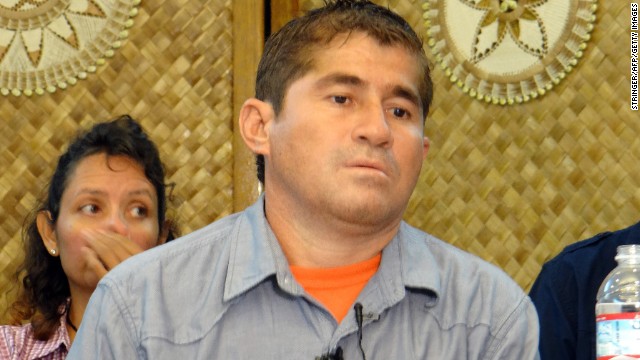
He had been readmitted
Thursday amid concerns his health was deteriorating. Doctors reported
that he was severely dehydrated, running low on vitamins and suffering
from swollen legs.
Alvarenga, whose tale of surviving 13 months adrift in the Pacific Ocean
has prompted fascination and skepticism, left the hospital Friday and
is now staying at a hotel in Majuro, the capital of the island chain.
Hospital officials didn't
provide an update on his condition. But Dr. Franklin House, a retired
American medic working at the hospital who has spent time with
Alvarenga, said he was concerned about the state of the castaway's
kidneys.
Alvarenga, an El
Salvadoran who had been living in Mexico before he got lost at sea,
washed ashore on the Marshall Islands more than a week ago. Earlier this
week, his condition improved enough for him to be released from the
hospital.
But after his health took a turn for the worse Thursday, plans for his repatriation to El Salvador have now been postponed.
House, who is not
Alvarenga's treating physician, said the castaway had complained to him
of kidney pain since his arrival at the hospital.
The 78-year-old doctor,
who speaks Spanish, said he suspects that Alvarenga is suffering from
scurvy as a result of his poor diet and that edemas are causing the
swelling and pain in his legs.
Alvarenga has said that
he survived during his months at sea by eating raw fish and turtles. He
says he relied on rainwater and urine for fluids.
Official: His story 'is probable'
Alvarenga's claims have
garnered widespread skepticism about how he could survive for 13 months
adrift on the Pacific. But from what officials can tell, they have no
reason to doubt him.
"The investigations into
Mr. Alvarenga's story so far have been substantiated," Phillip Muller,
the Marshall Islands' foreign affairs minister, said Thursday.
Christian Clay-Mendoza, a
Mexican diplomat working on Alvarenga's case, said that the castaway
was an undocumented worker in Mexico, but that "what he has said to us
about his identity, so far, has been true."
"The main question now is how long was he at sea," he said.
Clay-Mendoza said "it's probable" Alvarenga really did get lost at sea starting in December 2012, as the castaway has claimed.
If Alvarenga's story
proves true, the trip across the Pacific would have taken him across
roughly 6,600 miles (10,800 kilometers) of open ocean before ending in
the Marshall Islands, about halfway between Hawaii and Australia, in the
northern Pacific.
The other man
Alvarenga says he set off on a fishing trip from the port of Paredon Viejo, Mexico, near the southern coastal city of Tonala.
He said he and another
man intended to spend a day trying to catch sharks, but they were blown
off course by winds and then got caught in a storm, eventually losing
use of their engines.
Bellarmino Rodriguez
Beyz, the owner of Alvarenga's boat in Mexico, identified the fishing
partner as 23-year-old Ezequiel Córdova.
Alvarenga said that four
weeks into their drift, his companion died of starvation because he
refused to eat raw birds and turtles. Eventually, he threw the body
overboard.
"What else could I do?" Alvarenga said.
A grieving family
Back in the Mexican
village of El Fortin, Córdova's family is inconsolable. More than a year
after the young man went missing, his mother is grieving his death.
"The pain is so great, I can't explain it," Córdova's mother said. "Losing a child is the hardest thing to bear in life."
Córdova's brother said
the 23-year-old took care of his family -- and that's why he became a
fisherman, in hopes of earning a better livelihood.
"My brother was kind, he
was responsible for my mother," he said. "In fact, he worked in the sea
because of her. He wanted to improve himself. He didn't want to be
poor, like us."
Now that Córdova's mother knows her son is dead, she wants answers.
"As a mother, I demand
the authorities allow me to talk to the survivor," she said. "Only in
that way will I know what happened, and what he did with the body of my
son. I deserve to know the truth. "
No comments:
Post a Comment